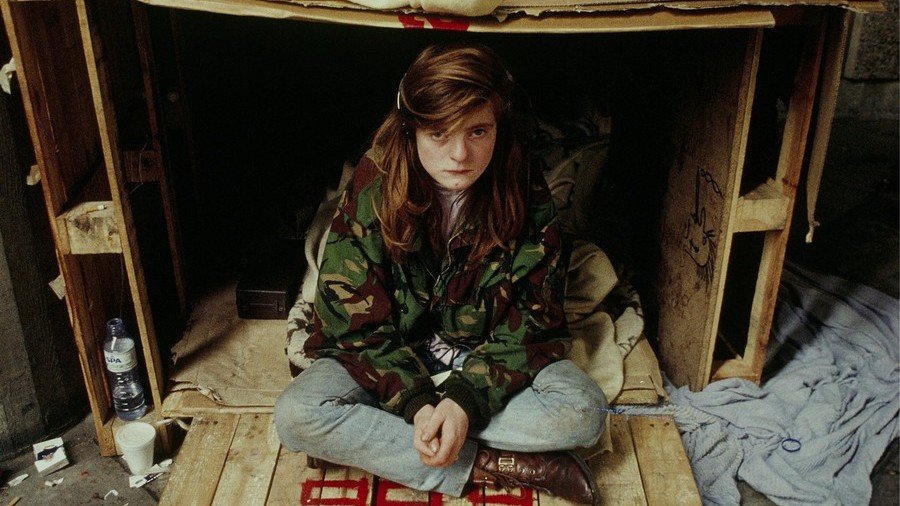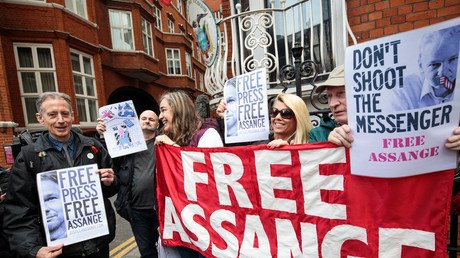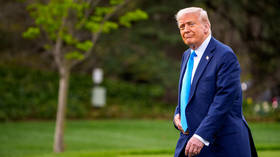Declaration of Human Rights is 70 this year, and Britain has violated every single article

A UN report on the shocking levels of child poverty in the UK is the tip of the iceberg. Since 2000, when UNICEF raised concerns over the state of British children, UN agencies have condemned British governments multiple times.
They have found that social policies violate the rights of women, disabled people and those needing legal assistance. This year, the Universal Declaration of Human Rights, one of the treaties supposedly designed to prevent these social crimes, turns 70. The individual articles of the Declaration are supposed to safeguard everything from the right to life and freedom of expression, to civil and economic rights, such as the right to decent work and pay, education and housing.
Also on rt.com Britain's enemy is not Russia but its own ruling class, UN report confirmsAs I document in my book Human Wrongs, the Declaration is a rather odd document. It was drafted by lawyers and championed by politicians on the winning side of the Second World War. The politicians said that the Declaration was merely aspirational and not to be taken as a legally-binding text. The lawyers, on the other hand, disagreed with the politicians and said that it should be legally binding. It was adopted in 1948 by the General Assembly of the United Nations, meaning that it had no enforcement mechanism. However, in 1976 the Declaration was finally adopted into British law as part of the International Covenant on Civil and Political Rights. Despite this, successive British governments have violated, in different ways, each of the Declaration’s 30 articles.
Let’s look at some examples.
This year’s 70th anniversary of the Declaration began with the UN Special Rapporteur on Racism, E. Tendayi Achiume, highlighting what she called the “structural racism” at the heart of British society. Achiume’s findings follow those of Dr. Rashida Manjoo, former Special Rapporteur for the UN Human Rights Council, whom in 2014 criticized Britain’s “boys’ club, sexist culture.” Dr. Manjoo described a culture of impunity, in which women are sexualized and marketized. Sexual bullying and harassment are “routine” in Britain, she said, and austerity has had a “disproportionate” effect on women. Dr. Manjoo was denied a visit to the UK’s notorious Yarl’s Wood facility, where women and girls facing deportation are held, many of them for indefinite periods.
Dr. Manjoo’s findings suggest that there has been no improvement in the rights of women since 2008, when the UN Convention on the Elimination of all Forms of Discrimination Against Women found that “British women are under-represented in Parliament, paid less than men at work and [are] increasingly being sent to prison for committing minor offences.” The report concluded that women’s pay was on average 17% lower than men.
Also on rt.com ‘Punitive, mean-spirited & often callous’: UN tears apart legacy of austerity in UKAlso in 2015, the UK received the dubious honour of becoming the first country to be investigated by the UN Committee on the Rights of Persons with Disabilities for what campaigners called “grave violations” of human rights, particularly relating to Department for Work and Pensions’ social security cuts. Raquel Rolnik, the UN Special Rapporteur for Housing, condemned the government’s under-occupancy charge, or “bedroom tax,” as breaching the human rights of disabled people by making their accommodation unaffordable due to their having extra, supposedly unlived-in rooms; when in reality rooms were often used to store medical equipment and as accommodation for carers. As if to prove Dr. Manjoo’s thesis about rampant sexism, Special Rapporteur Rolnik faced a torrent of personal abuse (e.g., labeled a “Brazil nut”) from men in the press and even from male politicians when she reported her findings.
READ MORE: ‘I’ll buy your family’: drunk Tory students ‘grope’ women at party of Rees-Mogg linked group
But the poor have equal access to legal systems in order to defend their rights, don’t they? Actually, no. In 2016, the UN Economic and Social Council criticized the Conservative government’s cuts to legal aid, which it said deprives vulnerable citizens of free legal representation. The report says: “The Committee is concerned that the reforms to the legal aid system and the introduction of employment tribunal fees have restricted access to justice in areas such as employment, housing, education and social welfare benefits.”
But we have a free press in Britain, don’t we? Journalists can expose the corruption and links between the businesses pushing for these policies and the Members of Parliament who enact them? Not exactly. In 2008, the UN committee on human rights said that British libel laws “discourage critical media reporting on matters of serious public interest, adversely affecting the ability of scholars and journalists to publish their work.” The Defamation Act 2013 was introduced, supposedly to rectify this, but ironically it made stating an opinion a defense and stating a fact a possible offense!
Also on rt.com ‘Murder, torture, sexual assault’ - MI5 & informants authorized to commit crimes in UK, court hearsWhat about the right to take to the streets and peacefully protest these conditions? In 2013, at the invitation of the British government, the UN Rapporteur on the Right to Freedom of Peaceful Assembly and Association, Maina Kiai, visited the UK. Kiai condemned the UK’s “use of embedded undercover police officers in groups that are non-violent” and went on to talk about surveillance and the lockdown tactic called kettling, the latter being “detrimental to the exercise of the right to freedom of peaceful assembly due to its indiscriminate and disproportionate nature.” In addition, Kiai later criticized the government’s so-called Prevent strategy which he said stigmatized Muslims and, with others, a draft surveillance bill.
Speaking of surveillance, as political prisoner Julian Assange and others have exposed, it’s not just protestors and pesky political activists being spied on. It’s everyone. In 2014, the Conservative government adopted the Data Retention and Investigatory Powers Act (DRIP). The UN High Commissioner for Human Rights, Navi Pillay, condemned the Act as “de facto coercion of private sector companies to provide sweeping access to information and data relating to private individuals without the latter’s knowledge or consent.” But Pillay’s report for the UN Human Rights Council went further, condemning the UK’s mass data collection as contrary to international law. Pillay also criticized David Cameron’s government for ramming DRIP through Parliament.
Sticking with spying, in 2015 Joseph Cannataci, the UN Special Rapporteur on privacy, said of the UK: “Your oversight mechanism is a joke, and a rather bad joke at its citizens’ expense.” In January 2016, UN Human Rights experts “called for a comprehensive review of the [UK’s] draft Investigatory Powers bill, warning that if adopted ... could threaten the rights to freedom of expression and association.” In March 2016, Cannataci submitted a report to the UN Human Rights Council on surveillance in the digital age. The report contained a section on the UK’s Investigatory Powers Bill and condemned its “disproportionate, privacy-intrusive measures.”
Turning to detention, in December 2015, the UN Working Group on Arbitrary Detention launched an investigation into political prisoner Assange’s de facto imprisonment in the Ecuadorian embassy. In early 2016, three out of the five members of the Working Group said: “Assange was arbitrarily detained by the Governments of Sweden and the United Kingdom,” and thus detained unlawfully.
It could be argued that Assange’s treatment amounts to torture. He’s confined, practically, to one room, a condition which takes its mental and physical toll. But Britain has also been overtly condemned for its role in torture. In 2009, Martin Scheinin, then-UN Special Rapporteur on the Promotion and Protection of Human Rights, named several countries including the UK as helping the US rendition (i.e., kidnap and torture) program. “While this system was devised and put in place by the United States, it was only possible through collaboration from many other States,” including PM Tony Blair’s Britain. The cases of Diego Garcia and Northern Ireland show that Britain has, in the recent past, allowed torture to take place in its own territories. In more recent years, the UN Committee Against Torture’s report on the UK (2013) expressed concern about the Conservative government’s “position on the extraterritorial application of the Convention.”
So, in conclusion the recent UN alert over the state of child poverty builds on a history of the organization’s exposés. The long journey towards the realization of fundamental rights continues. It must be bolstered by grassroots activism and solidarity. The trouble is, politicians are experts at dividing to conquer.
By T.J. Coles
Dr. T.J. Coles is director of the Plymouth Institute for Peace Research, a columnist with AxisOfLogic.com and the author of several books, including Human Wrongs (iff Books).
Think your friends would be interested? Share this story!
The statements, views and opinions expressed in this column are solely those of the author and do not necessarily represent those of RT.















